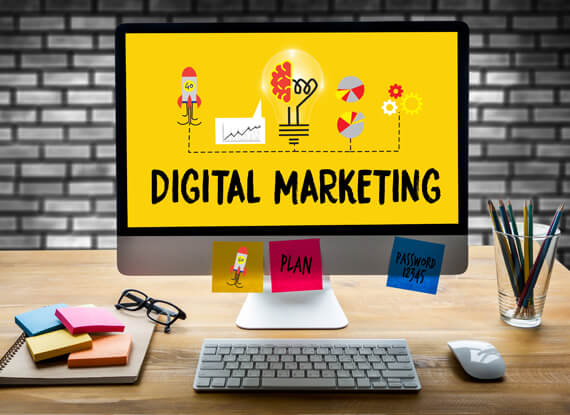Digital marketing for lawyers: Introduction
Traditional marketing methods are no longer sufficient as people increasingly rely on digital resources for information and services. Today, the percentage of consumers shopping around online for legal services has risen to almost 50%. So, if your law firm still needs to embrace digital marketing to attract new clients, now is the time to do so.
The following digital marketing for law firms guide examines why digital marketing is so important for modern lawyers, the tools used to drive success, and how to ensure your digital efforts deliver that all-important ROI.
With helpful tips to grow your law firm, we give you everything you need to connect with your clients in the right way, at the right place, and at the right time.
-
Key Takeaways
- Paid search advertising offers immediate visibility and is a cost-effective lead generation strategy to build sales pipeline for law firms.
- Content marketing is vital for law firms, increasing conversion rates by six times more than firms that do not utilise it effectively, making it crucial for long-term growth.
- A well-designed law firm website not only enhances credibility but also increases conversion rates through improved user experience and clear calls-to-action.
- Local SEO is crucial for law firms, as it helps in improving online visibility, with 93% of people leaving a website if it doesn’t display properly on their device.
- Video marketing is highly engaging, with search engines favouring video content, thus boosting SEO and enhancing brand authority.
The importance of digital marketing for lawyers
Digital marketing is all about understanding your potential clients, knowing where to find them, and talking to them in a way that engages.
- 75% of UK law firms are harnessing the power of digital marketing (Lawyerism)
- The biggest online marketing strategy for law firms is website optimisation (CallRail)
- The proportion of consumers saying they had seen information on law firm websites about services, along with staff profiles or timelines is now almost two-thirds (63%) (The Legal Services Consumer Panel’s 11th annual tracker survey)
- 45% of legal firms spend money on remarketing to follow up with leads that didn’t become customers (CallRail).
- Google accounts for over 95% of global mobile search market share (Statistica)
- LinkedIn now has over a billion users across 200 countries worldwide (LinkedIn)
1. National SEO for law firms
National SEO uses strategies and tactics to improve a law firm’s online visibility nationwide. Unlike local SEO, which focuses on attracting local customers within a specific geographic area, national SEO targets a broader audience across the entire country or region.
Recommendation: Learn more about SEO by reading our in-depth SEO for law firms guide. If you work within the PI department, you can jump straight to the SEO for personal injury lawyers guide.
National SEO marketing top tips for law firms
A) On-page optimisation
On-page optimisation tactics include:
- Integrating relevant keywords and phrases into your web content
- Focusing on long-tail keywords that capture specific legal queries and intent
- Optimising your meta tags with identified keywords
- Publishing blog posts, articles, case studies, and legal guides to attract organic traffic nationwide.
B) Off-page optimisation
Off-page optimisation involves building external signals and factors that influence a site’s authority, relevance, and trustworthiness in the eyes of search engines. Mostly, this means building high-quality backlinks from reputable websites within the legal industry and related niches.
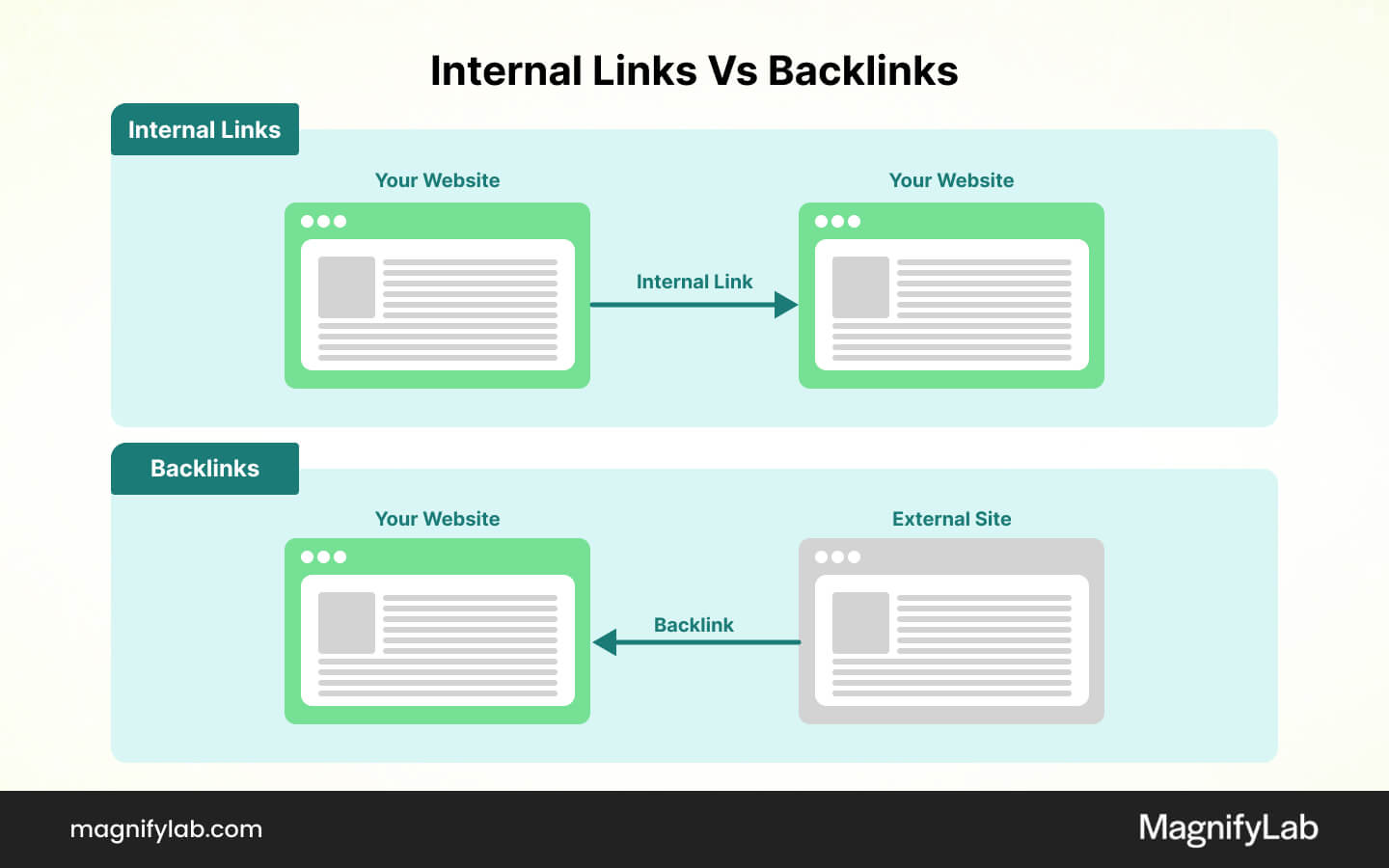
Here are some examples of backlinks for the legal industry:
- Legal directories
- Industry publications
- Legal associations
- Guest posts
- National media
- Legal media
Other off-page optimisation tactics include social media engagement, influencer outreach, online reviews, and participation in online forums and communities.
C) Technical optimisation
Structuring your website correctly, content curation, micro-markup, and website speed checks are essential to put your law firm in the strongest possible position. Ensuring your site is responsive, loads quickly, and provides a seamless user experience across all devices is non-negotiable. You must also submit the XML sitemap to help search engines crawl your website and rank your web pages.
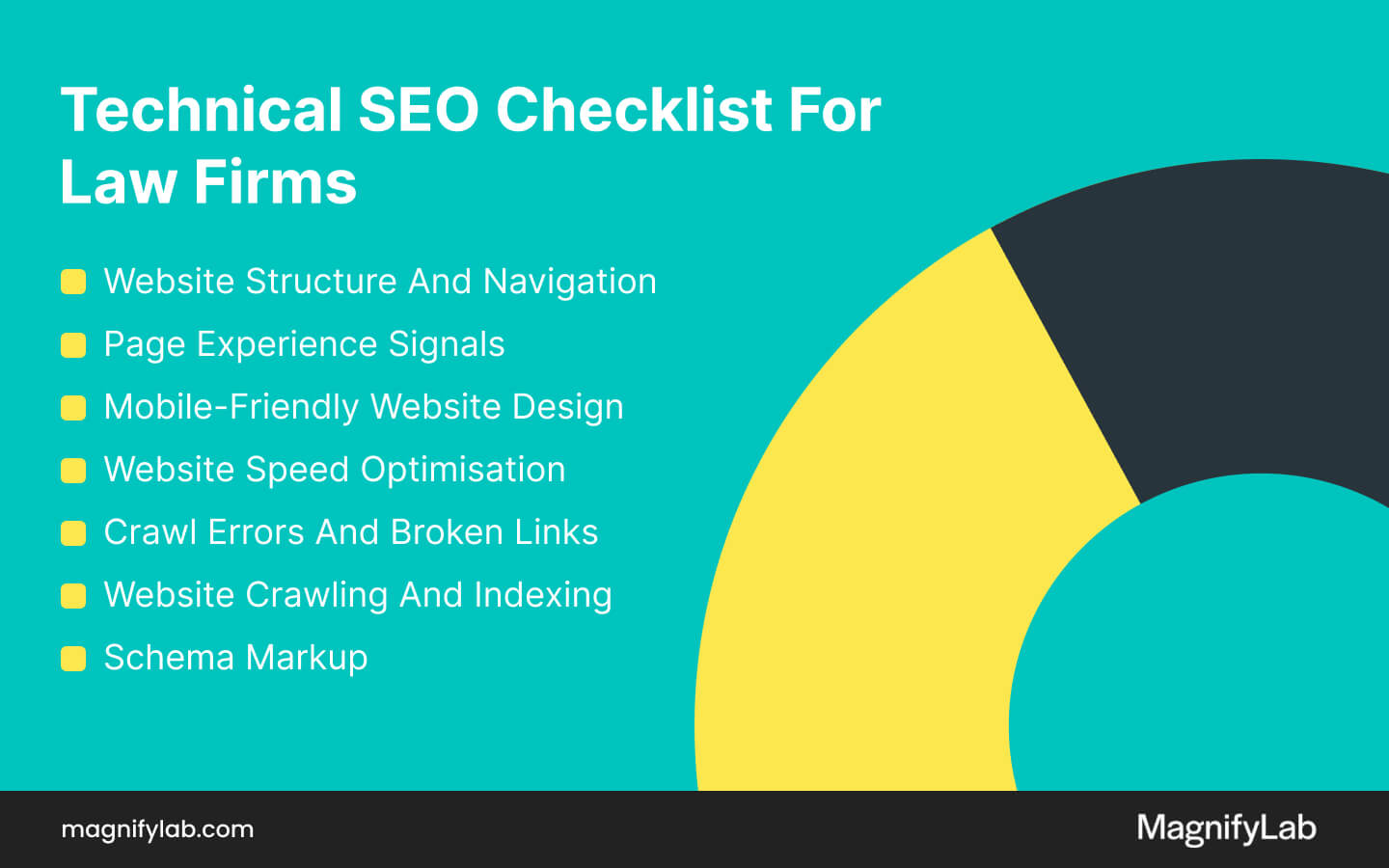
Benefits of national SEO
- Visibility. National SEO helps law firms reach a broad audience of potential clients across the country, regardless of their geographic location
- Increased website traffic and leads. National SEO drives traffic to your site, increasing the likelihood of conversions
- Enhanced brand authority. Ranking prominently in national search results positions your law firm as an authoritative and trusted source of legal information and services on a national level
- Competitive advantage. Ranking higher in national search results helps firms stand out and attract clients in a crowded marketplace.
2. Paid search for law firms
When it comes to pay-per-click (PPC), advertisers pay a set amount each time someone clicks on their ad. With potential clients turning to search engines like Google to find legal services, paid search has become crucial to any successful law firm’s marketing strategy.
PPC can quickly help lawyers achieve high quality leads. And while Google Ads dominates the search engine market, by leveraging both Google and Bing Ads, firms can maximise their reach and effectiveness in the world of PPC advertising.
Recommendation: To learn more about this topic, please read our PPC marketing for lawyers guide
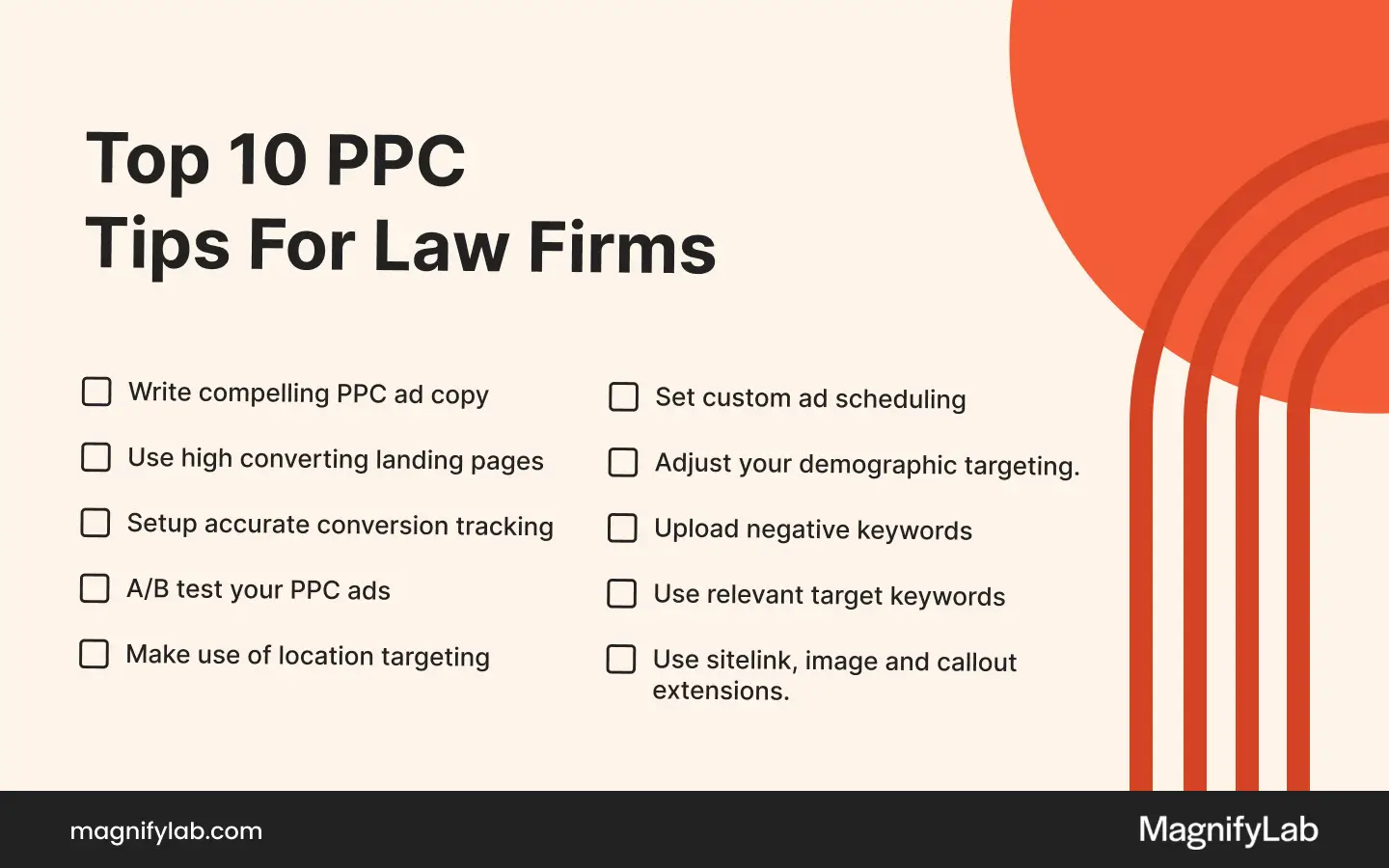
Paid search marketing top tips for law firms
A) Focus on keyword strategy
Thorough keyword research is needed to identify the search terms and phrases potential clients are using to find legal assistance. Firms in competitive areas should focus on long-tail keywords with lower competition and higher intent to attract qualified leads.
B) Write compelling ad copy
Craft persuasive ad copy highlighting the firm’s unique value proposition, expertise, and services. Your ads should also include a clear call-to-action (CTA) to encourage users to click.
Test different text, keywords, and targeting options to identify what resonates most with your audience. Top tip: remember you can add up to 3 responsive search ads (RSA’s) to each ad group, where you can test different messaging.
C) Use landing pages to maximise efficiency
Landing pages optimised for conversions, with clear messaging, user-friendly design, and easy-to-complete contact forms, are essential. These pages should provide valuable information that addresses the needs and concerns of potential clients and have clear and compelling CTAs.
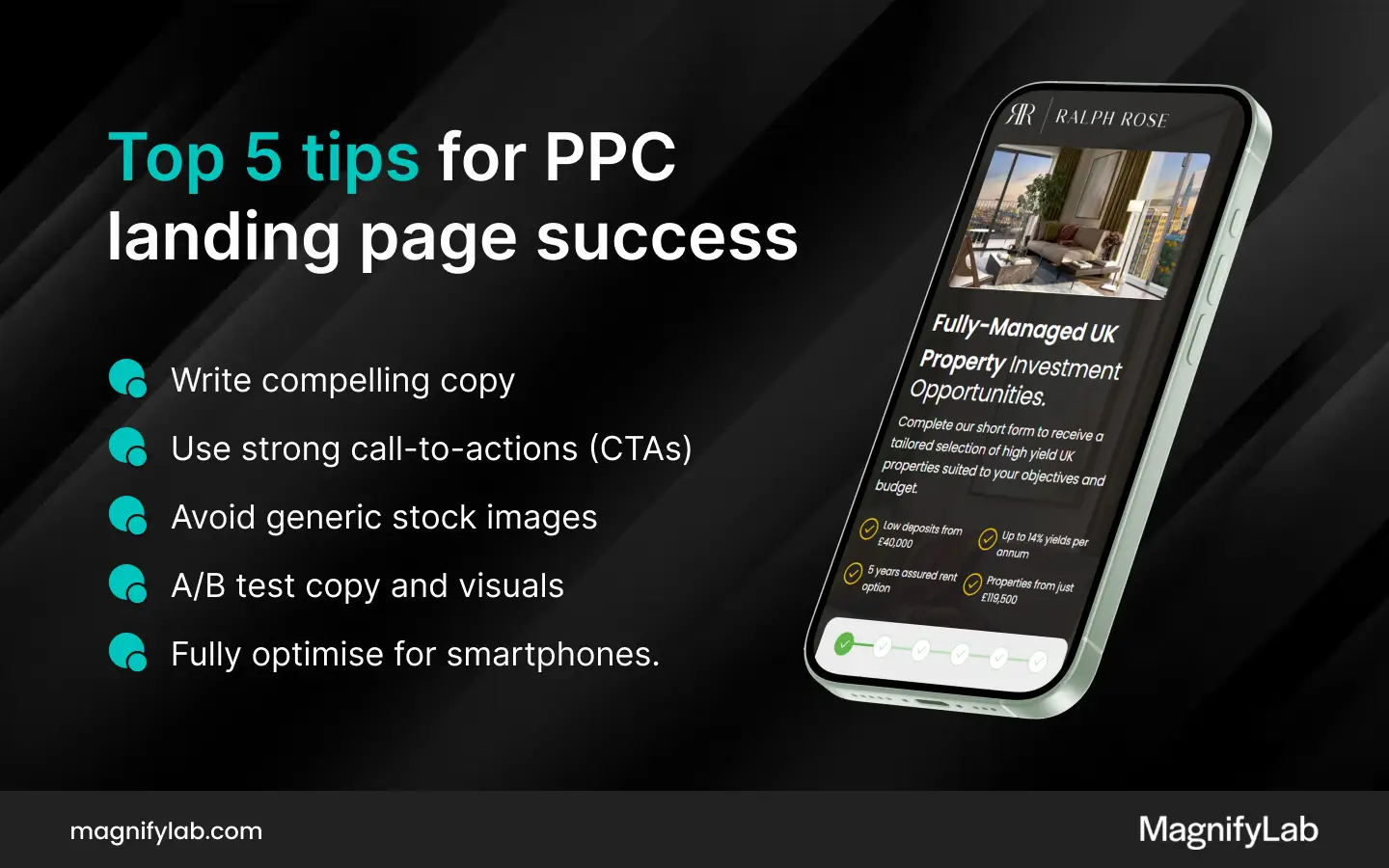
D) Target locations of interest
Google Ads and Bing Ads provide robust targeting options, allowing firms to focus on locations of interest. Advertisers can ensure the most relevant audiences see their ads, whether targeting by postcode, town, or radius basis. This level of granularity maximises the relevance and effectiveness of legal digital marketing campaigns, driving higher engagement and conversion rates.

E) Measure all conversions
By implementing conversion tracking tags on their websites, law firms can track a wide range of actions, including form submissions, phone calls, and other key events. With access to detailed conversion data, law firms can make informed decisions about their advertising budgets, bidding strategies, and targeting options.
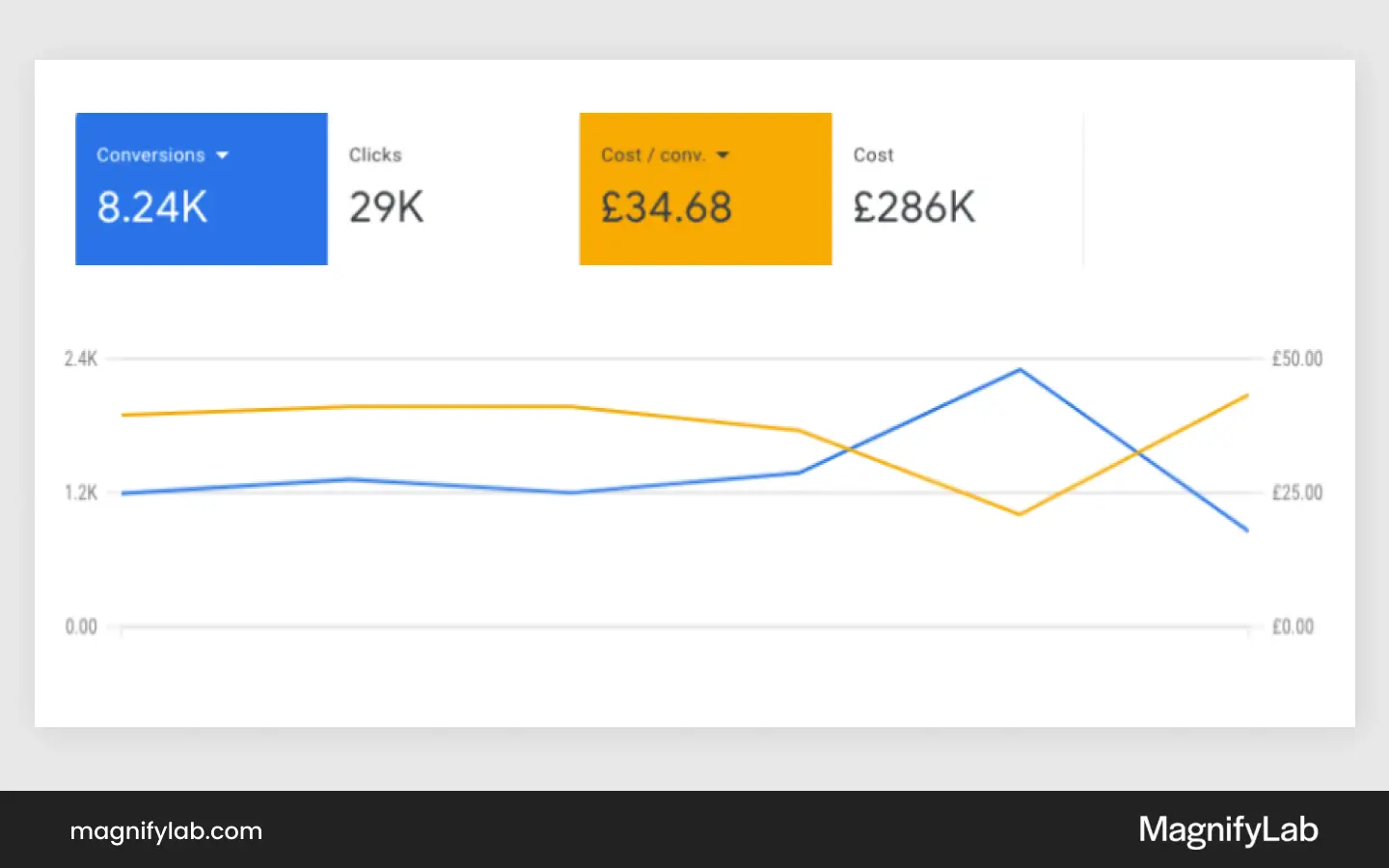
Benefits of PPC advertising
- Immediate visibility. Unlike SEO, which can take time to produce results, paid search advertising offers immediate visibility. Law firms can launch targeted ad campaigns and start appearing in relevant search results almost instantly.
- Highly targeted. Precision targeting ensures ads are seen by those individuals most likely to be interested in the firm’s services.
- Cost-effectiveness. With paid search advertising, law firms only pay when users click on their ads, making it a cost-effective lead-generation tool.
- Measurable. Paid search provides detailed metrics and analytics, allowing law firms to track the performance of their ad campaigns in real time.
3. Content marketing for law firms
Content marketing involves providing potential and current clients with relevant and insightful information and ideas. It aims to connect with your target audience rather than immediately sell to them.
If a business provides valuable information, people are more likely to buy from it when ready. As such, content marketing is a powerful tool for delivering sustainable growth.
Businesses that adopt content marketing have conversion rates six times higher on average than those that don’t. Content Marketing Institute
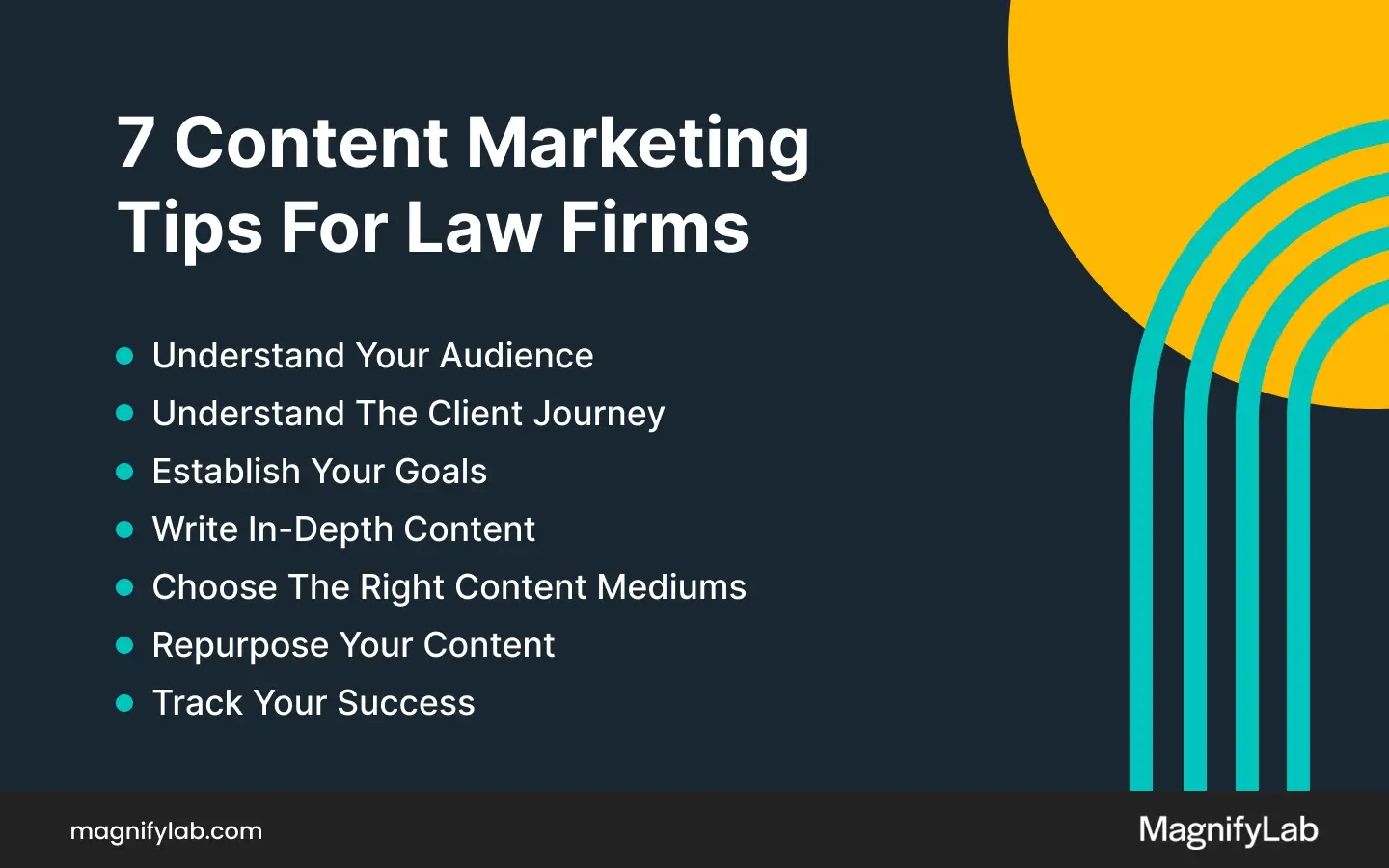
Content marketing top tips for law firms
Read our main tips below to elevate your law firm content marketing results.
Understand your audience
Content marketing helps you attract those most likely to become your clients. But you can only appeal to them by first knowing who they are.
Use market research and data about existing customers to create a fictional profile of an ideal client (also called a ‘buyer persona’).
Once you have this persona, tailor your content to their needs and preferences, ensuring everything you produce appeals directly to them.
Understand the client journey
A great digital marketing strategy requires an in-depth understanding of the ‘client journey’. Put simply, you need to know what information to give and when. For instance, consider using the following content at these stages:
- Awareness. Educational blog posts, infographics that simplify complex information, short explainer videos
- Consideration. Case studies, webinars, detailed guides
- Decision. Promotions or landing pages offering a free initial consultation, client testimonials, FAQs
Establish your goals
Everything you create needs a purpose. The goal for each whitepaper, guide, blog, newsletter, or social media post you create should be clear and measurable. For example, your goals might be to:
- Increase organic website traffic to a particular practice area by 25%
- Increase social media engagement by 50%
- Generate a set number of new leads for an ongoing case.
Track your success
If you’ve invested time and money into your law firm’s content marketing, it must be worth it. Use available metrics to track success and monitor your performance regularly.
Write in-depth content
Think bigger to stand out. More extensive in length and depth, the benefits of long-form content include:
- SEO. Search engines tend to favour longer, high-quality content, as it provides more value to readers
- Brand Authority. Longer content lets law firms showcase their expertise, helping build trust and credibility
- Audience Engagement. Long-form content can be more engaging and satisfying for readers interested in learning about a topic
- Lead Generation. Comprehensive guides or whitepapers can attract potential clients willing to provide their contact information in exchange for access.
Choose the right content types
Examples of content your law firm could create include webinars, blog posts, videos and infographics.
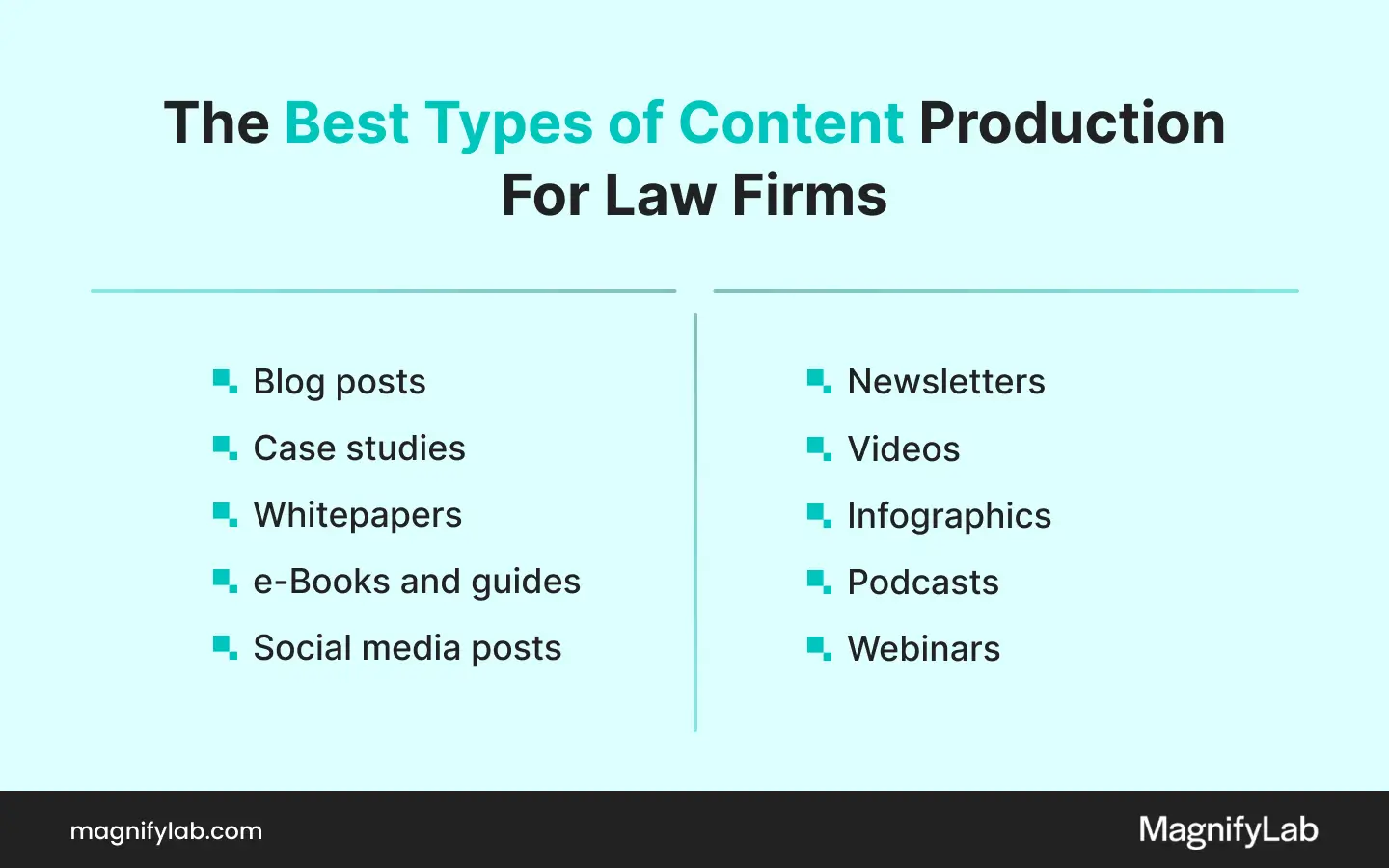
Repurpose your content
Quality content takes time. Find ways to repurpose it and get the most out of your investment. Repurposing and adapting content will help you to:
- Reach new audiences across different platforms and channels
- Engage with people in a format that suits them best (e.g. some people prefer videos while others prefer articles)
- Maximise value by leveraging content you’ve already produced
- Reinforce key messages
- Save time and resources
- Increase your visibility in search engine results pages (SERPs) by creating multiple pieces of content around a single topic or keyword
- Experiment with different formats, styles, and messaging strategies.
Benefits of content marketing
- Increased web traffic. Regularly sharing valuable content on your website will improve your SEO rankings, increase your chances of being discovered by potential clients, and help you attract more organic site visitors
- Raised brand awareness & authority. Consistently producing high-quality content will raise awareness of your firm and establish your lawyers as authorities in their sectors
- Increased lead generation. By offering valuable resources, your firm will capture prospects’ interest and guide them towards purchasing or taking another desired action
- Improved engagement. Your firm will foster a sense of loyalty by providing valuable information or solutions to problems.
4. Jaw-dropping legal web design
First impressions matter. And as your law firm website is often the first point of contact for potential clients, you must get it right.
Beyond providing information, a well-designed website that enhances user experience (UX) will play a pivotal role in shaping the firm’s perception, establishing credibility, and ultimately attracting and retaining clients.
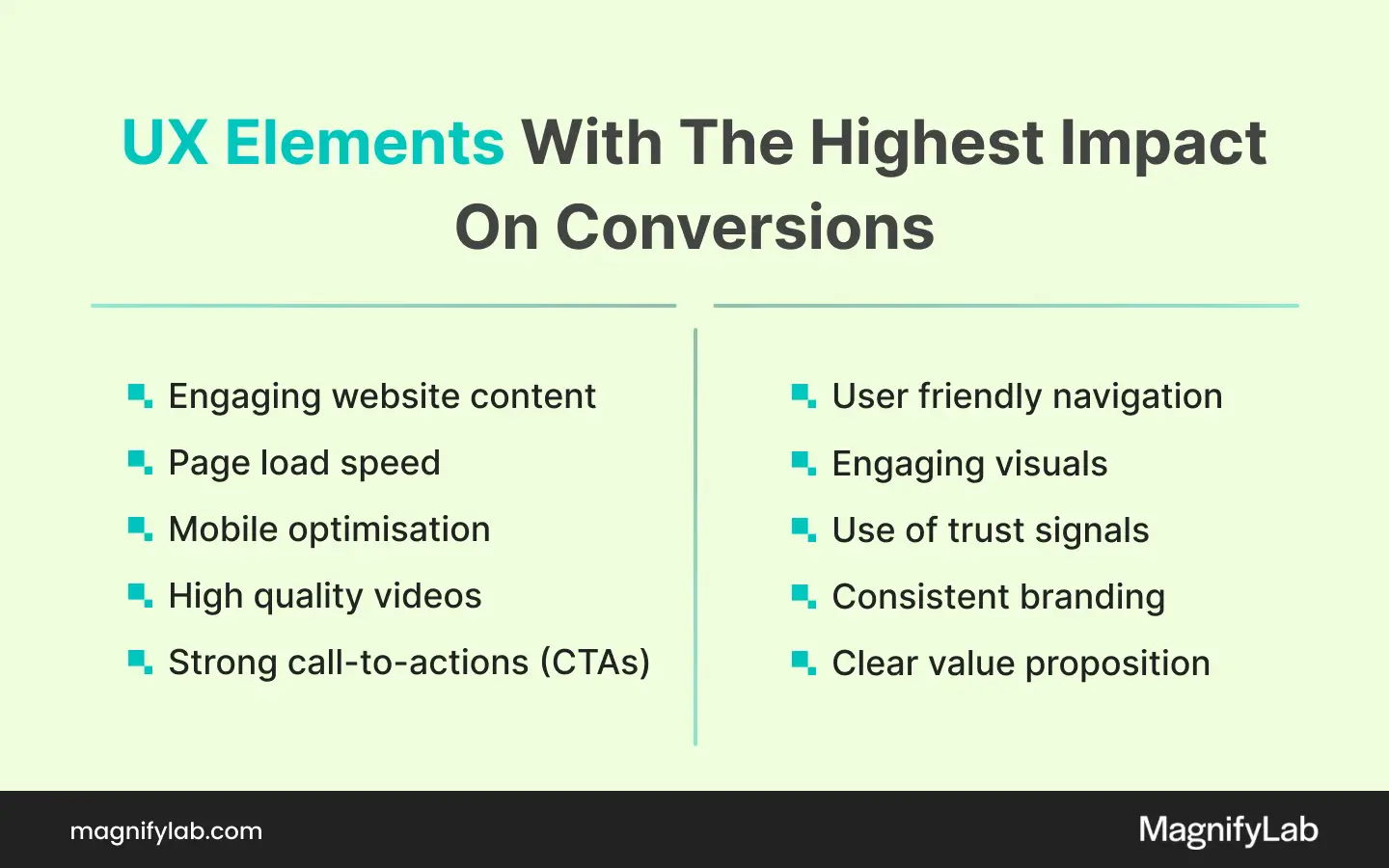
Recommendation: Get inspiration from our useful guide on the best law firm website designs in 2025.
Explore our best law firm websites blog
Website design top tips for law firms
A) Deliver a great user experience
User-friendly and intuitive website navigation is essential for guiding visitors through your site and helping them find the information they need efficiently. Simple menus, clear labels, and logical site structure make locating relevant content easy.
Alongside this, it’s imperative to ensure your webpages load fast. This is a reasonable expectation from your target audience and the last thing you want is to slow webpages that result in users bouncing to competitor websites.
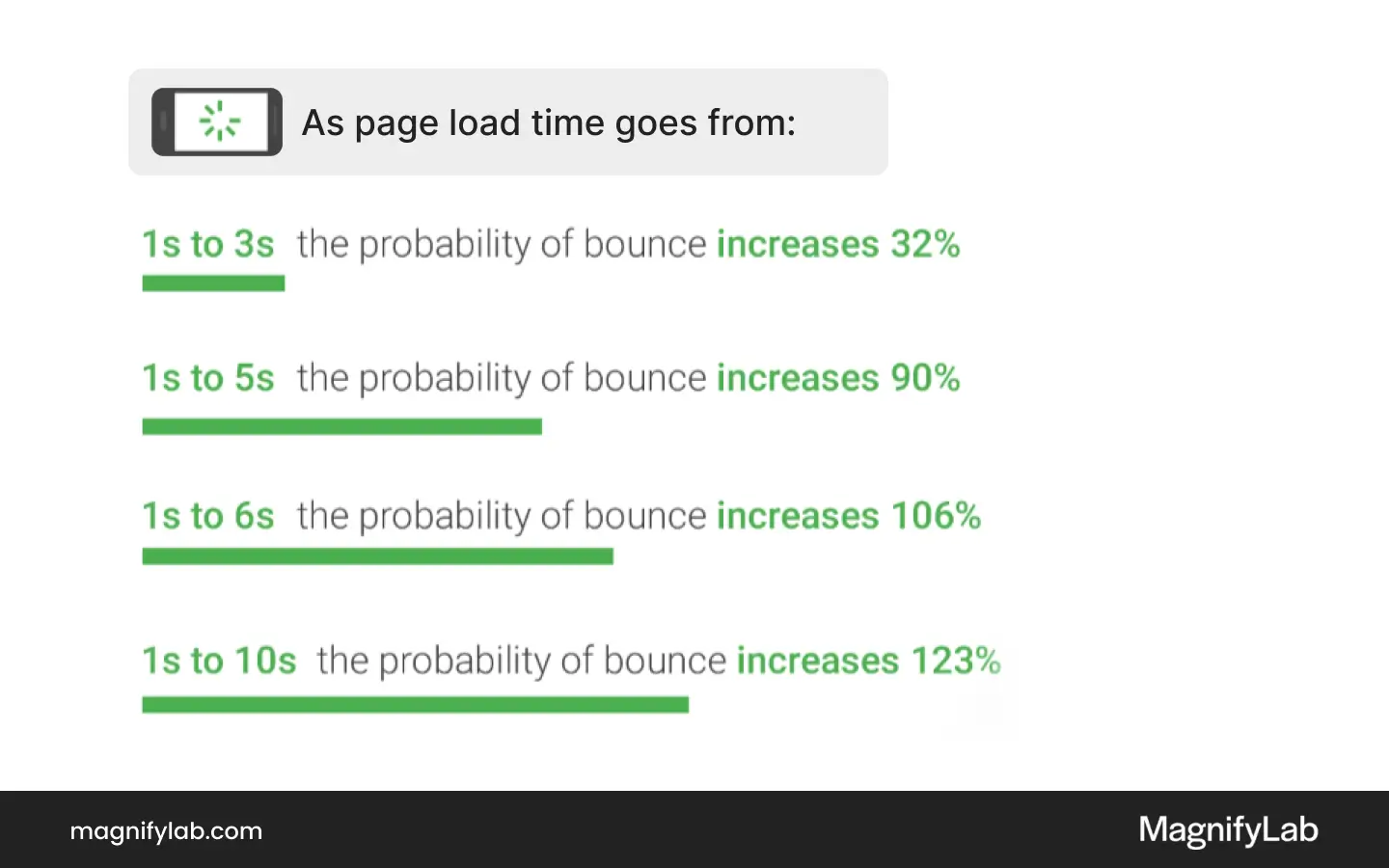
B) Consider the colour scheme & typography
When thinking about design, clarity and accessibility are paramount. Legal information can be complex, so it’s crucial to present content clearly and understandably.
Thoughtfully chosen colours and typography contribute to readability and brand consistency, so clean and legible fonts and harmonising colour palettes are essential.
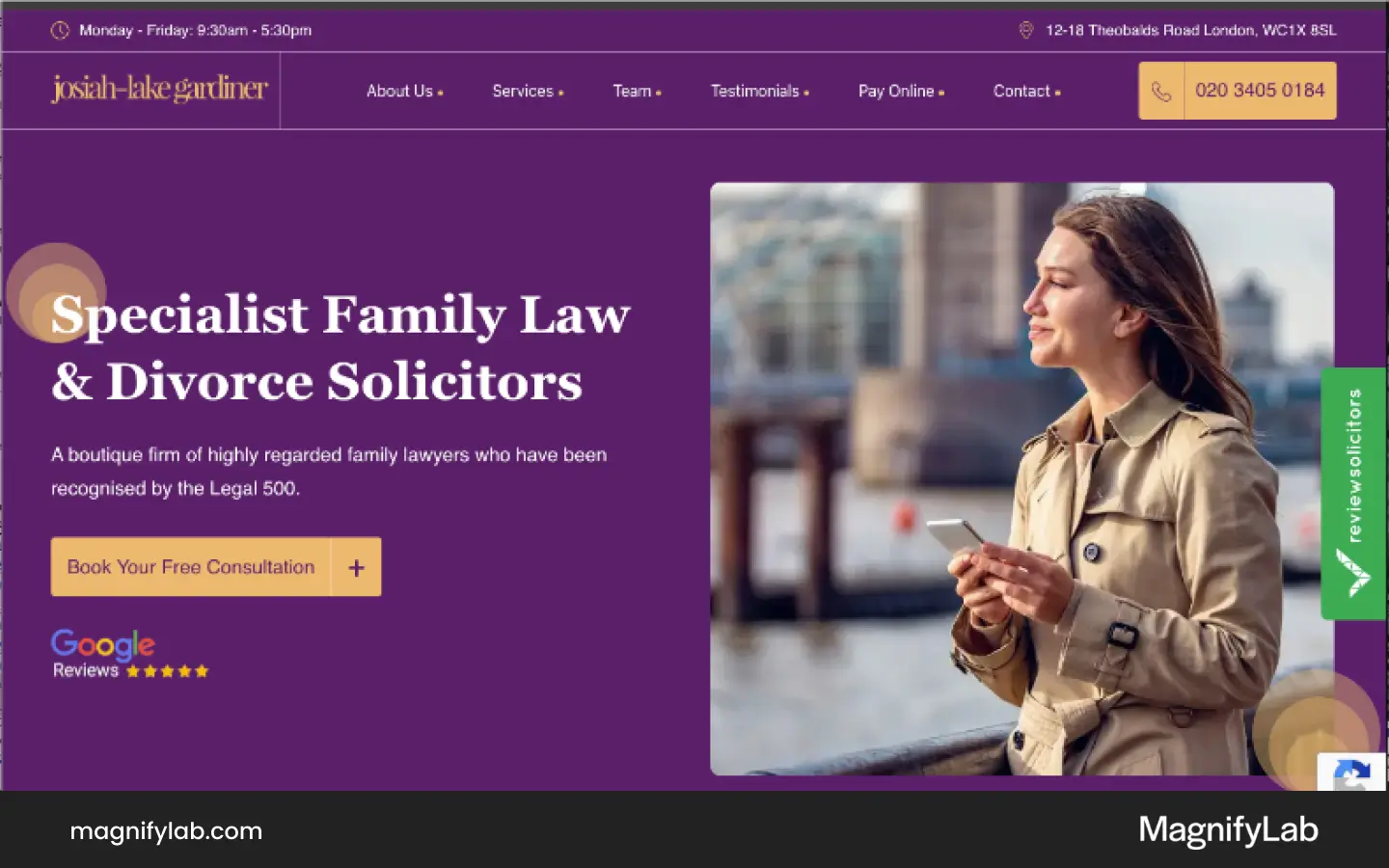
C) Make your CTAs stand out
CTAs encourage visitors to take desired actions, such as contacting the firm, scheduling a consultation, or downloading a resource.
Strategic placement of CTAs – accompanied by persuasive language and visually distinct buttons – will capture visitors’ attention and encourage them to take the next step towards becoming clients.
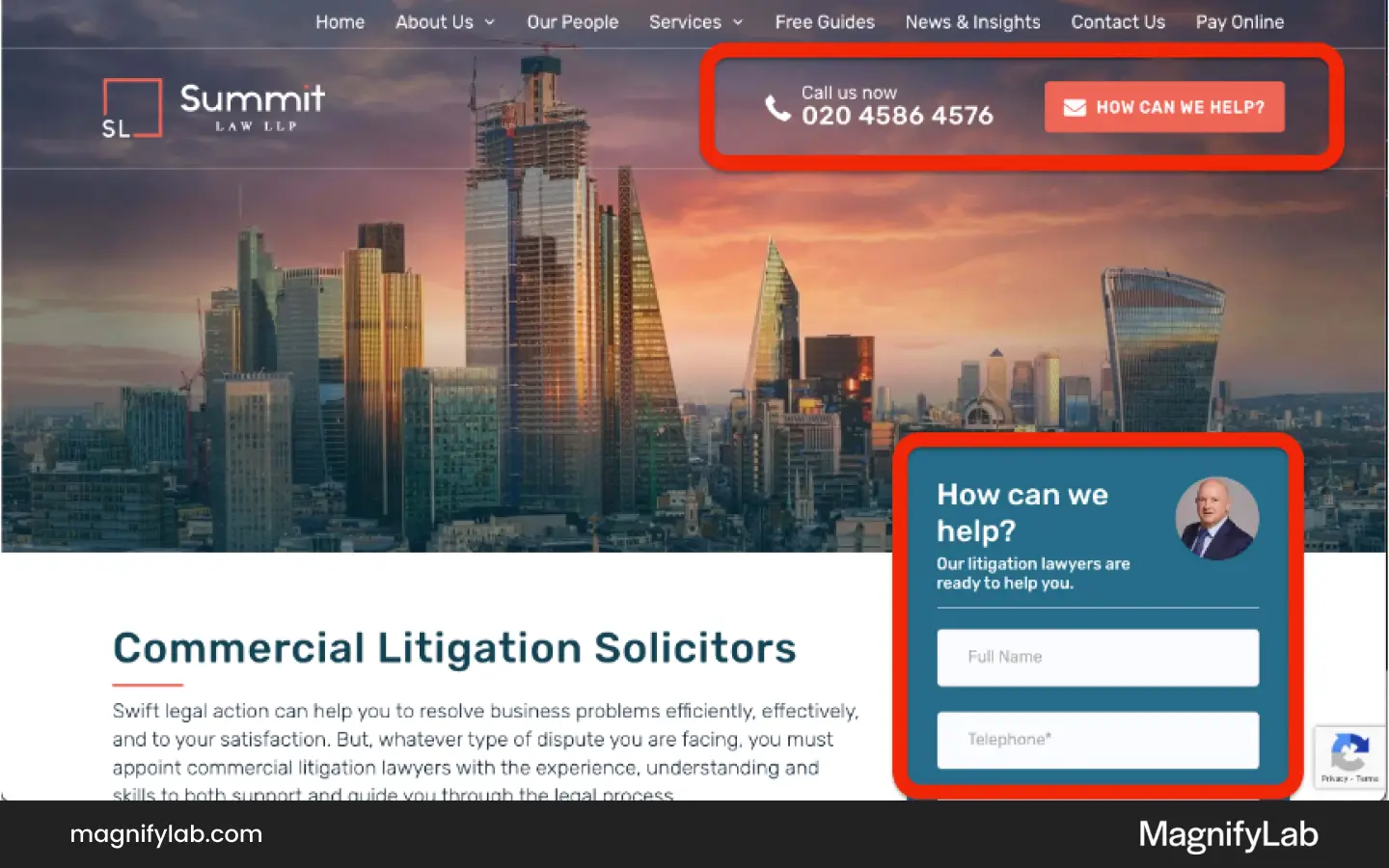
D) Optimise for mobile users
With most internet traffic now coming from mobile devices, law firms must prioritise mobile optimisation. A responsive website design ensures your site is accessible and functional across various screen sizes and devices, providing a seamless experience for users.
93% of people have left a website because it didn’t display properly on their device.
HubSpot
E) Use trust signals
Trust signals such as client testimonials, industry awards, and certifications reassure potential clients of the firm’s expertise and reliability. And while word of mouth is still one of the main ways lawyers get clients, but this is increasingly happening online.
Showcasing authentic feedback from previous clients, platforms such as Google Reviews, Trustpilot, and ReviewSolicitors are especially powerful in the legal sector. Positive reviews and high ratings can help a law firm differentiate itself in a competitive market.
ReviewSolicitors has reported a 66% growth in numbers of users visiting its platform, and a 200% increase in numbers of law firms engaging with the website.
Quality indicators in legal services pilot project report
Benefits of excellent web design
- Increased credibility. A well-designed website instills trust in potential clients and sets the firm apart from its competitors
- Enhanced user experience. Intuitive navigation and user-friendly design make it easy for visitors to find the information they need quickly and efficiently. This ensures visitors have a positive interaction with the firm – encouraging engagement and repeat visits
- Higher conversion rates. By guiding visitors through the user journey and prompting them to take action, a well-designed website drives results for the firm
- Greater SEO visibility. Effective web design increases a firm’s visibility in search engine results and enhances its competitiveness in the digital marketplace.
5. Local SEO for law firms
Local SEO (Search Engine Optimisation) helps improve a law firm’s visibility when someone searches online for legal services within a specific location (e.g. employment lawyer Manchester, divorce solicitor London, etc.).
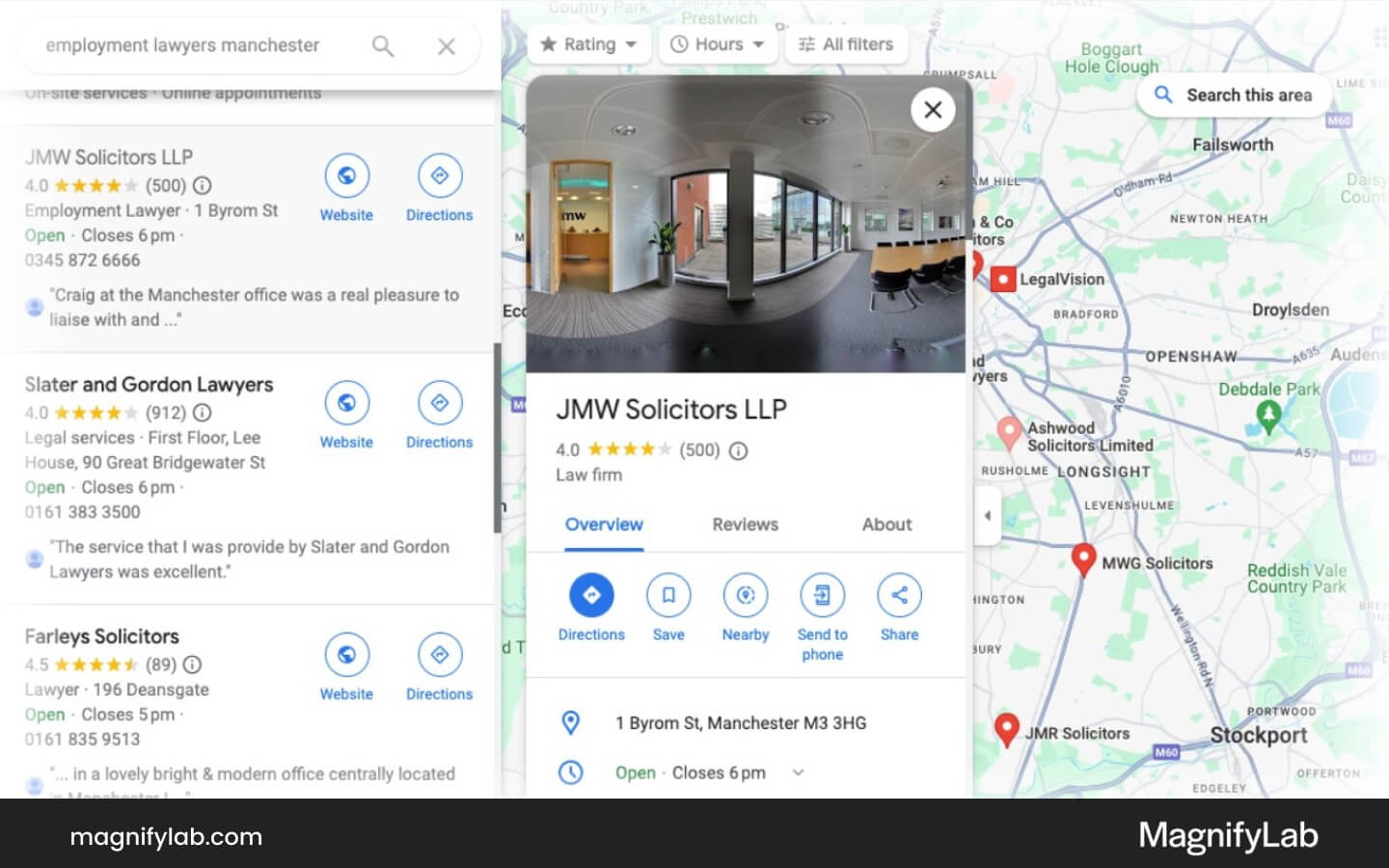
The primary aim of local SEO is to help companies attract more local customers, so it is beneficial for businesses with a physical presence, such as law firms.
Local SEO marketing top tips for law firms
A) Optimise your Google Business profile
A Google My Business listing is essential for local SEO success. Claim your listing, ensure that all information is accurate and up-to-date, and optimise it with relevant keywords, photos, and a compelling description of your services.
B) Manage your online reviews
Encourage satisfied clients to leave positive reviews on platforms like Google My Business, Review Solicitors, and Trustpilot. You should also regularly monitor and respond to reviews to demonstrate your commitment to client satisfaction and build trust with potential clients.
C) Be consistent
Ensure your business name, address, and phone number are consistent across all online directories, listings, and citations. Consistency is critical for building trust with search engines and improving your local search rankings.
D) Target local keywords
Incorporate localised keywords into your website content, meta tags, and headings to improve your visibility. Focus on long-tail keywords that include your city, county or town, and the specific legal services you offer.
E) Create local content
Create high-quality, relevant content that addresses your local audience’s legal needs and concerns. For example, blog posts, FAQs, and legal guides tailored to your geographic area.
Benefits of local SEO
- Increased online visibility. Local SEO helps law firms appear prominently in local search results, making it easier for potential clients to find and contact them
- Targeted reach. By optimising for local keywords and location-based searches, firms can connect with individuals who are more likely to convert into clients
- Increased competitiveness. By investing in local SEO, firms establish themselves as a leading firm in the areas they serve. Potential clients are more likely to choose a firm with a reputation for excellence in their community
- Enhanced trust. A solid local online presence, including positive reviews and high rankings in local search results, enhances the credibility of a law firm
- Cost-effective. Law firms can attract targeted local traffic and generate leads without breaking the bank.
6. Email marketing for law firms
Email marketing is less expensive than traditional forms of marketing because it can deliver targeted, personalised messages directly to clients’ inboxes. What’s more, it has the potential to reach a vast audience, collect valuable information, and deliver an impressive return on investment.
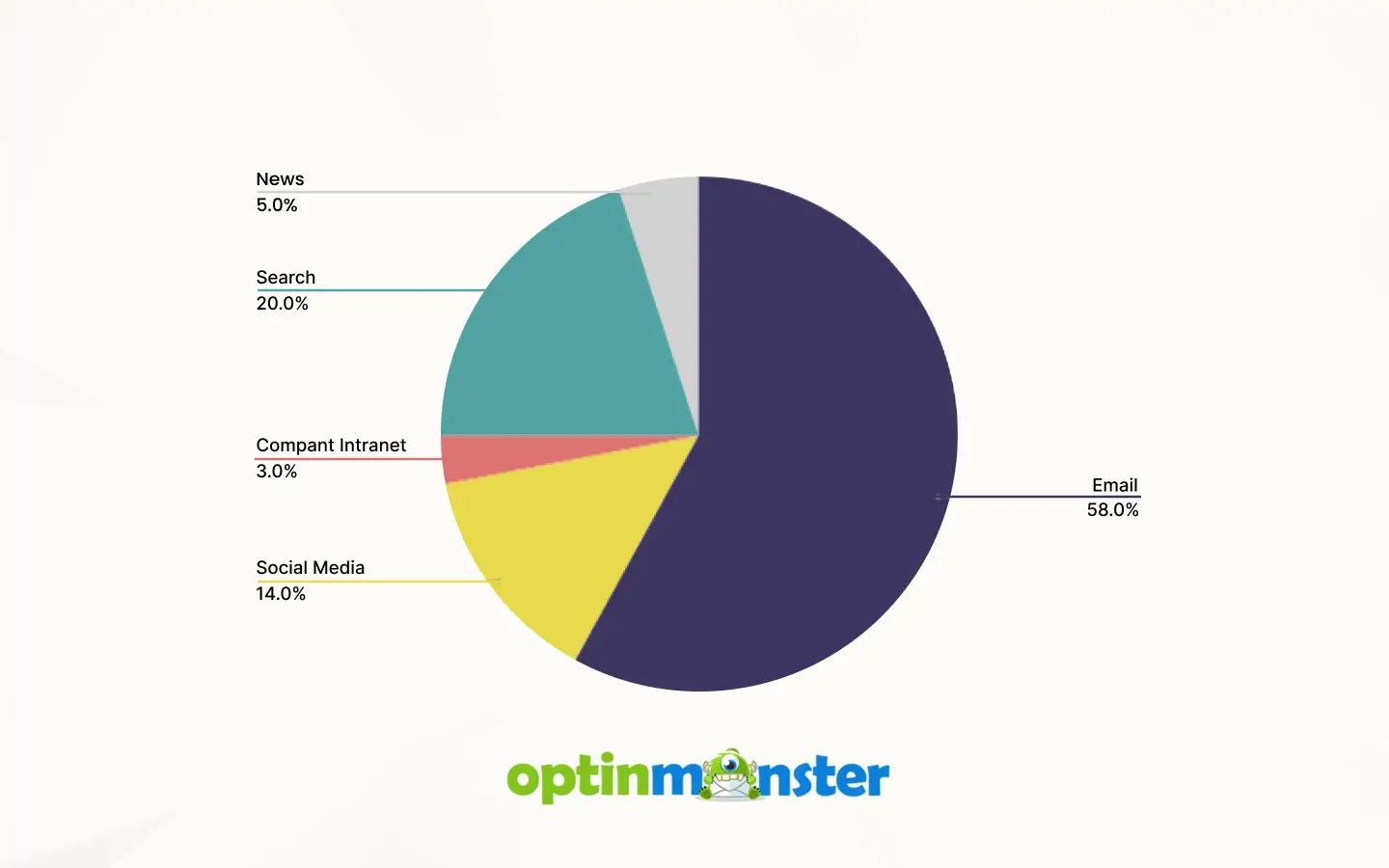
Email marketing top tips for law firms
A) Build a quality email list
Start by building a GDPR -compliant, permission-based email list of clients, prospects, and other contacts who have opted in to receive communications from your firm. Offer incentives such as valuable content or exclusive offers to encourage sign-ups and engage interested recipients.
WARNING: Targeting people with the wrong content at the wrong time isn’t likely to appeal to anyone, so segment this list to tailor messages, improve targeting accuracy, and drive conversions.
B) Nurture new leads
Once someone has expressed interest in your services, continue providing value to build trust over time. Segment your email list based on the stage of the buyer’s journey and tailor your content accordingly to increase the likelihood of conversion into clients.
C) Keep existing clients informed
Use email to inform existing clients about critical legal updates, firm news, and upcoming events. Engaging with current clients will help law firms strengthen relationships, encourage repeat business, and foster long-term satisfaction.
Popular types of emails for law firms
Examples of emails your law firm could send include appointment reminders, welcome emails, firm news and legislative updates.
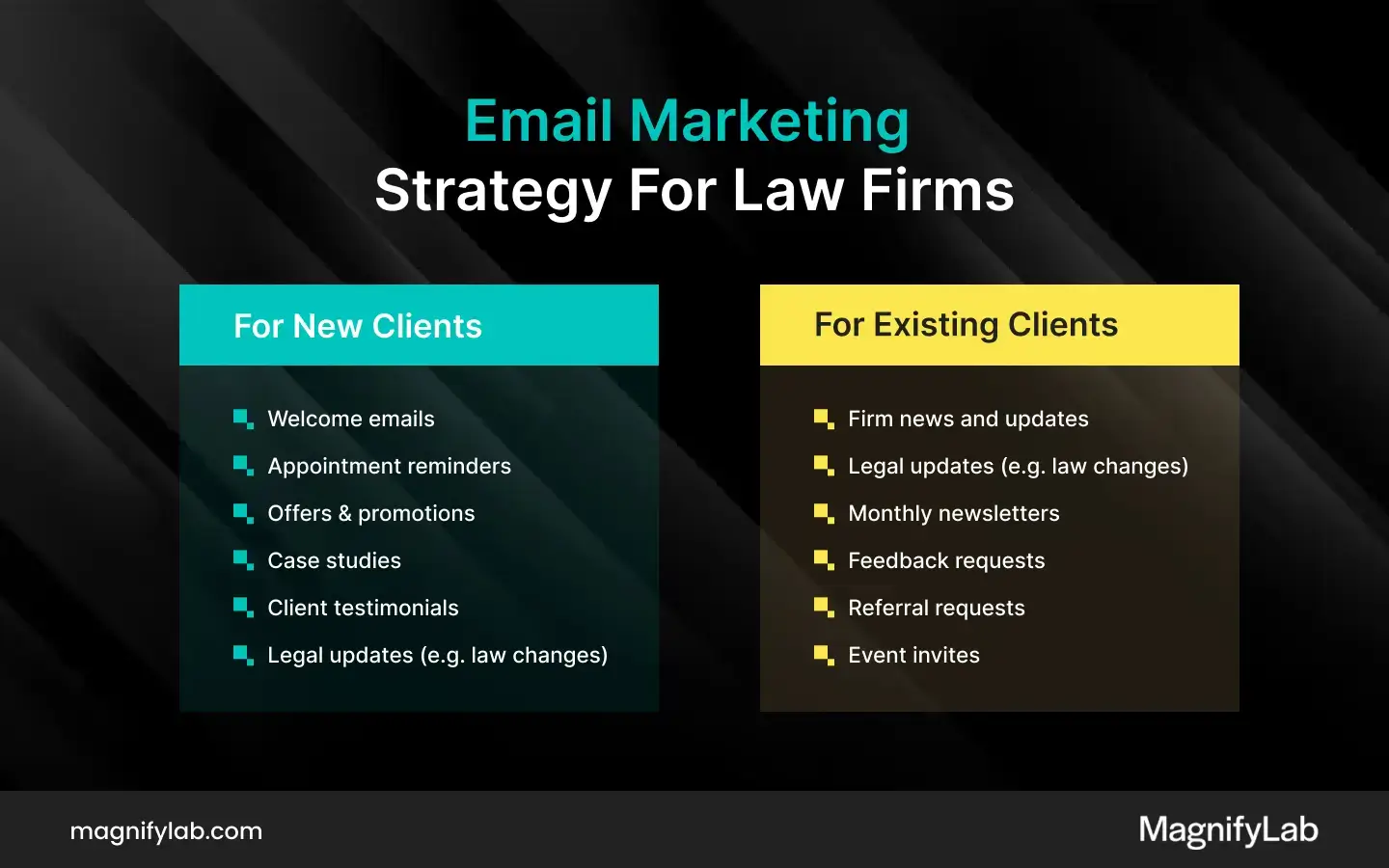
Benefits of email marketing
- Increased engagement. Email marketing helps law firms stay front-of-mind with clients and prospects by delivering timely, relevant messages directly to their inboxes
- Increased loyalty. Regular email communications foster engagement and loyalty. This leads to repeat business, less drop-offs, and more referrals
- Targeted communications. By tailoring content to individual recipients, firms can increase the relevance and effectiveness of their email campaigns and drive higher engagement and conversions
- Cost-effectiveness. With minimal investment required, firms can deliver targeted messages to a large audience at a low cost
- Measurable results. Law firms can track key metrics such as open rates, click-through rates, and conversions to evaluate the success of their email efforts and make data-driven decisions to optimise future campaigns.
7. Paid social advertising for law firms
In 2024, people spent an average of 145 minutes on social media every day. Social media advertising has become an integral part of the marketing landscape for law firms.
While organic efforts are valuable for building brand awareness and engaging with followers, paid social media advertising offers a targeted and cost-effective way to amplify your firm’s message and drive business growth.
Popular social media channels for paid legal ads
LinkedIn Ads helps law firms connect with professionals, decision-makers, and influencers. The leading professional networking platform, LinkedIn offers advanced targeting options based on job title, industry, company size, and seniority level.
The platform is best suited to B2B legal services, where you can target other businesses at the top of the funnel. To make this work, it’s best to formulate a full-funnel communications strategy that helps to build awareness and nurture your audience towards conversion.
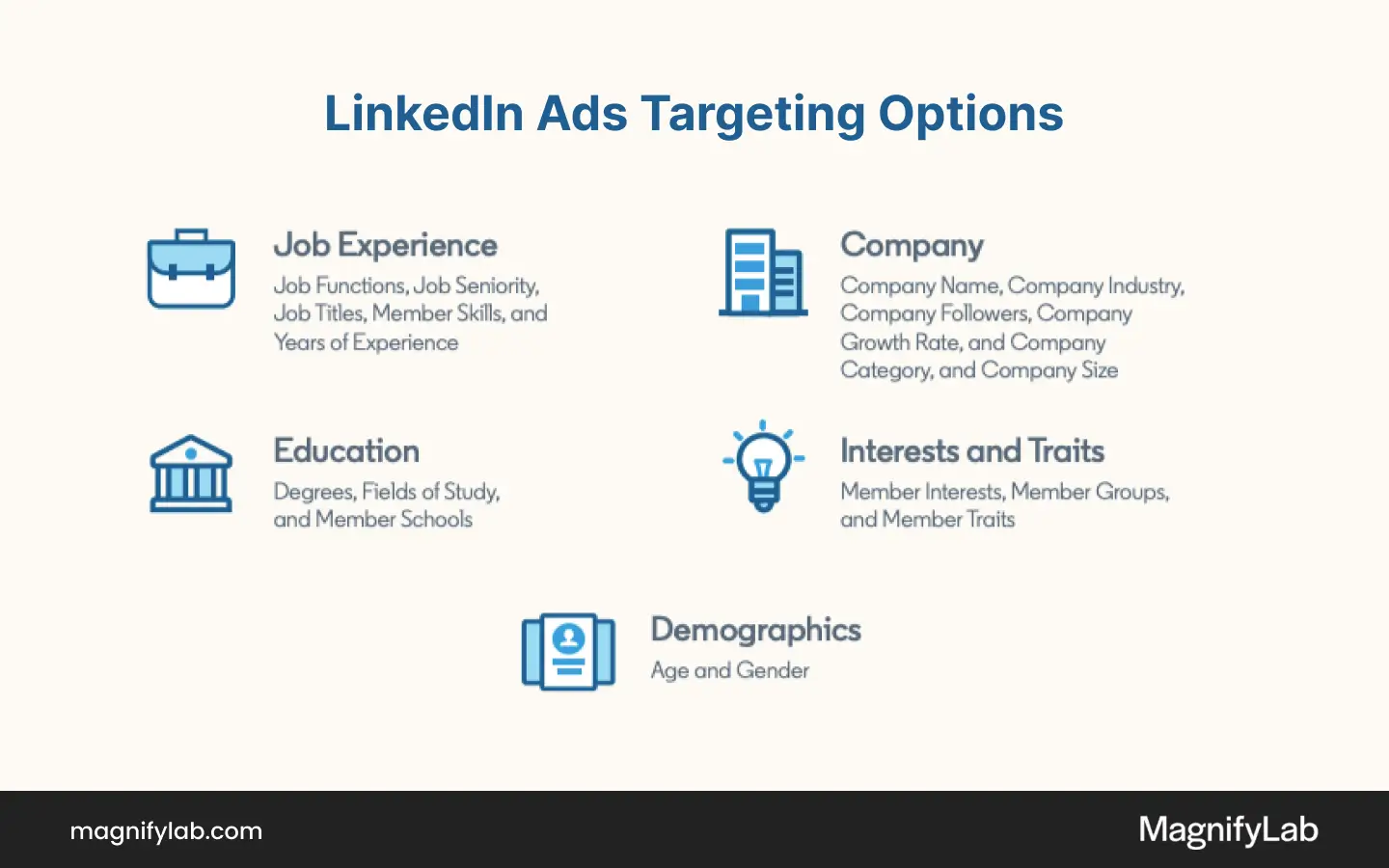
Facebook Ads helps firms connect with potential clients on the world’s largest social media platform. Whether promoting your firm’s services, sharing informative content, or driving traffic to your website, with Facebook Ads you can engage with potential clients where they spend a significant amount of their time online.
Facebook is widely used by Gen Z and millennials. In fact, the most popular age group on Facebook is 25-34, closely followed by those 18-24 years old.
For law firms, Facebook can still be an effective channel for both prospecting and remarketing strategies.
Whether you plan to run a traffic campaign or lead generation campaign, ensure strong use of creative assets to deliver the best possible results.
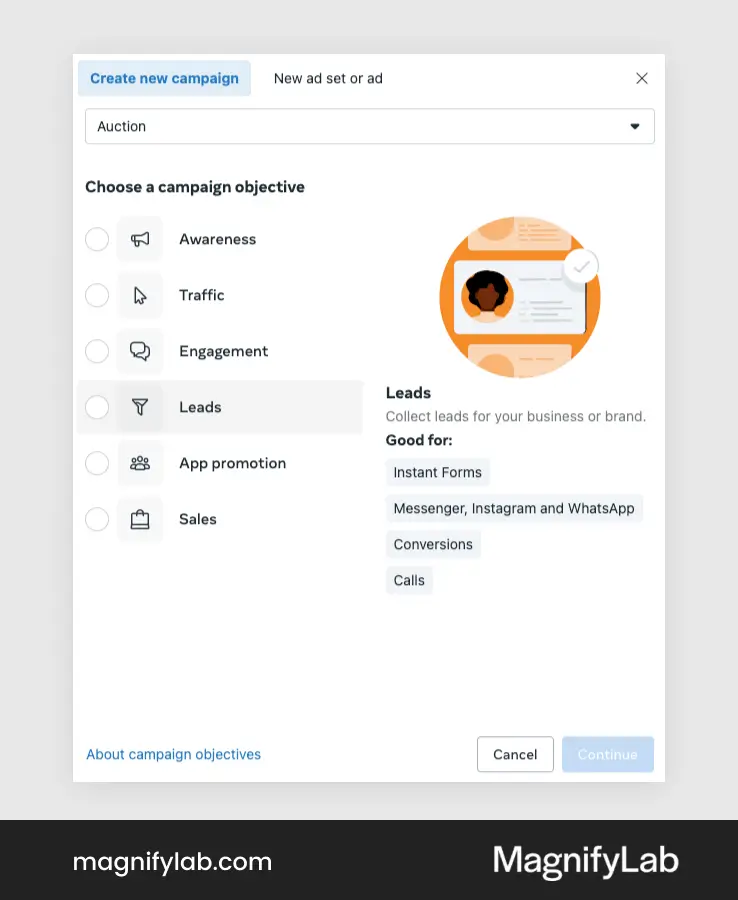
Instagram Ads offer a visually engaging platform for law firms to showcase their brand and connect with potential clients. Whether through photo, video, carousel, or Instagram Stories, law firms can leverage captivating visual storytelling ads to convey their message and showcase their expertise.
Benefits of paid social advertising
- Targeted reach. Paid social media advertising lets law firms target those potential clients who are most likely to be interested in their services
- Increased reach. By promoting your content and ads to a wide audience, you can attract more followers, drive website traffic, and expand your firm’s online reach
- Increased client acquisition. By strategically targeting users at different stages of the buyer’s journey, you can guide them through the conversion process and ultimately acquire new clients
- Measurable results. Social media advertising platforms provide robust analytics and reporting tools that allow you to track the performance of your campaigns in real time.
8. Video marketing for law firms
Video offers law firms a powerful and versatile digital marketing tool for engaging with clients, building brand awareness, and establishing authority in their practice areas.
Video marketing top tips for law firms
Establish your video marketing goals
Every video you create needs a purpose, so figure out what you want your visual marketing efforts to achieve. Whether you want to increase brand awareness, generate leads, drive website traffic, or showcase expertise, having defined objectives will guide your video strategy and help you measure success.
Identify your target audience
To create video content that resonates, you need to start by understanding your target clients’ needs, preferences, and pain points. Only then can you tailor your messaging and content and use language and visuals that speak directly to them.
Optimise for SEO
Optimising your video content for search engines can maximise its visibility. Relevant keywords, titles, descriptions, and tags can help your videos rank higher in search results and attract more organic traffic to your website or channel.
Make it engaging
Attention spans are short, so keep your videos concise and to the point. Focus on delivering valuable information or using storytelling techniques to create engaging content that connects on an emotional level.
Types of video content
Examples of videos you could create to support its law firm digital marketing include:
|
|
Benefits of video marketing for law firms
- Increased engagement. Video content is inherently more engaging and memorable than text-based content, so it’s more likely to capture and retain viewers’ attention
- Brand differentiation. Through video storytelling, firms can connect with viewers on an emotional level and leave a lasting impression that helps to differentiate them from their competitors
- Improved SEO. Search engines highly favour optimised video content, making it easier for law firms to achieve higher search rankings
- Demonstrate expertise. Video helps law firms demonstrate their knowledge and authority, increasing credibility and trust among potential clients
- Expanded reach. By distributing video content across multiple channels and platforms, firms can extend their reach and attract new clients from diverse demographics.
Benefits of hiring a Legal Digital Marketing Agency
While many law firms recognise the importance of digital marketing, navigating the complex world of online advertising, content creation, and SEO can be daunting. Whether you do your own law firm digital marketing in-house or hire a specialist agency depends on the size of your firm and the expertise at your disposal.
For smaller firms, hiring a legal digital marketing agency is a no-brainer. Because even when you have lawyers passionate about digital marketing, finding the time for them to promote your firm effectively is all but impossible when every billable hour counts. Even when there are in-house marketing teams, all too often they are pushed to capacity, so many tasks just never get done without external support.
That’s where we come in. On hand to offer much-needed digital marketing support to lawyers and legal marketers, we use all our skills and expertise to get the results you need without any budgetary waste.
The benefits of using a marketing agency for your law firm’s digital marketing
- Access the very best expertise. With expertise in areas such as SEO, paid advertising, content marketing, and social media management, digital marketing agencies can develop and execute customised strategies tailored to the goals of your law firm
- Ensure you are up to date. In an ever-evolving digital landscape, the knowledge and insights of experienced professionals will ensure that your marketing efforts are effective, efficient, and aligned with the latest and best practices
- Save time and resources. By outsourcing your digital marketing efforts to a reputable agency, you can free up valuable time and resources
- Only spend what you need. Digital marketing agencies offer scalability and flexibility to accommodate your firm’s changing needs and goals
- Get measurable results. Digital marketing agencies leverage advanced analytics and reporting tools to track the performance of your campaigns.
Best ways to measure Return on Investment
- Conversion Tracking. Use Google Analytics and other tools to monitor and track conversions such as form submissions, email sign-ups, phone calls, or downloads
- Cost per Acquisition (CPA). Divide the total campaign cost by the number of conversions to determine the average cost of acquiring a new customer or lead
- Return on Ad Spend (ROAS). Calculate ROAS by dividing the total revenue generated by your ads by the total ad spend
- Customer Lifetime Value (CLV). Calculate the customer lifetime value by estimating the revenue generated from a client over their entire relationship with your business, including repeat purchases and referrals
- Revenue Tracking. Track the revenue generated directly from your digital marketing campaigns. This can include sales made through online bookings or other measurable conversions tied directly to your marketing efforts
- Marketing Metrics. Monitor key performance indicators (KPIs) such as website traffic, click-through rates, conversion rates, and engagement metrics to gauge the effectiveness of your digital marketing campaigns.
Final thoughts
A robust online presence will give your firm a significant competitive advantage and ensure it is found by potential clients seeking legal services online. Even better, digital tools enable precise targeting based on demographics, interests, and behaviours, ensuring your messages resonate effectively with the intended audience.
However, to ensure your law firm’s digital marketing efforts deliver that all-important ROI, you need a strategic approach, knowledge of the latest online channels, and the time and resources to get things done.
Partnering with a legal digital marketing agency, you can stay ahead of the curve and outshine your competitors with targeted, effective marketing strategies that drive results.
Whether ranking higher in search engine results, engaging with clients on social media, or producing compelling content showcasing your expertise, a digital marketing agency will help your firm stand out and attract more clients.
If you’re ready to unlock your business growth, get in touch with our experienced team today.
